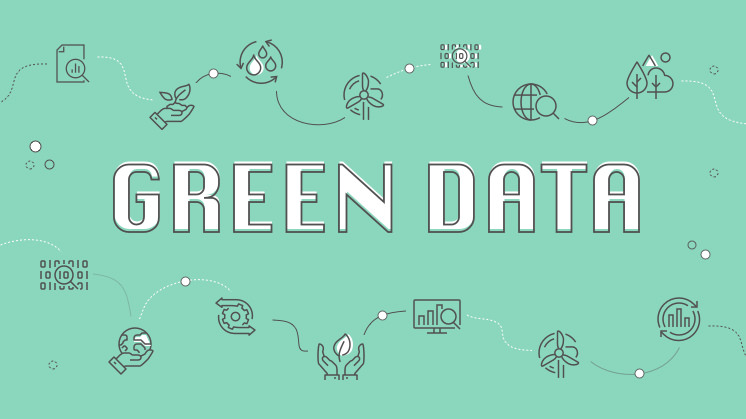Big data and environment
Green data: Can statistics help the environment?
The application of big data to curb global warming and protect the environment is known as green data. This technology can help optimise the efficiency of the energy sector, make businesses more sustainable and create smart cities, among others.

Life in the 21st century is codified in the form of numbers, keywords and algorithms: a chaotic universe of ever-expanding data. Big data is the set of technologies created to store, analyse and manage this bulk data, a macro-tool created to identify patterns in the chaos of this explosion in information in order to design smart solutions.
Today, big data is used in areas as diverse as medicine, agriculture, gambling and environmental protection.
Big data and environment
Climate change is the greatest challenge we face as a species and environmental big data is helping us to understand all its complex interrelationships. The application of big data to curb global warming is what is known as green data.
Europe has different green data generating models and one of them is Copernicus. It is a satellite-based Earth observation program capable of calculating, among other things, the influence of rising temperatures on river flows. Copernicus is already providing key information to optimise water resource management, biodiversity, air quality, fishing and agriculture.
Other international projects that use green data to combat climate change include:
-
Aqueduct: measuring water-related hazards, analysing water quality and quantity and making interactive risk maps available to the public.
-
Global Forest Change: calculating deforestation by counting trees one by one using high-resolution satellite imagery.
-
Danger Map: determining pollution thanks to data provided by millions of citizens.
BIG DATA AND RENEWABLE ENERGY
Using big data can strengthen the competitiveness of renewable energies in relation to fossil fuels. Let's look at some of the contributions environmental big data is making to different clean technologies:
-
Wind power: the use of complex algorithms to construct predictive models of wind conditions helps determine the amount of energy that is going to be produced.
-
Photovoltaic energy: big data optimises the efficiency of power stations by allowing them to adapt to the luminous intensity at any given moment.
-
Hydroelectric power: the management of large volumes of data can contribute, among other aspects, to avoiding leaks in the power plants and to having greater control over water flows.
Consumers in the renewables' sector will also benefit from this information revolution. On the one hand, the connection of data from smart meters with weather forecasts will make it possible to adjust demand in real time, favouring the creation of fully customised tariffs. On the other hand, the Internet of Things will make it possible to reduce energy consumption, for example, by adapting lighting and ambient temperature or the consumption of certain household appliances to each and every need.
El “Green Data”, Un aliado para el desarrollo sostenible
- El Green Data
- Contra el cambio climático
- Centrales sostenibles
- Energía eólica
- Consumo energético
- Tarifas personalizadas
- Agricultura sostenible
- Gestión inteligente de residuos
- Economía circular
- Alerta en los océanos
- Calidad del agua
- Sin fugas en las hidroeléctricas
El Green Data

Contra el cambio climático
Facilitará el análisis del consumo instantáneo del agua, las emisiones de CO₂, etc.

Centrales sostenibles
Favorecerá su máximo aprovechamiento con el control de la intensidad lumínica y las circunstancias medioambientales.

Energía eólica
Ayudará a predecir con mayor precisión la producción de generación.

Consumo energético
Ayudará a reducir el 20% del consumo energético de los edificios.

Tarifas personalizadas
Permitirá ajustar la demanda de electricidad de cada cliente.

Agricultura sostenible
Mejorará el rendimiento de las cosechas a través del estudio de las semillas y la meteorología.

Gestión inteligente de los residuos
Optimizará la recuperación y el reciclaje de los residuos a través de la centralización de los datos.

Economía circular
Encontrará modelos más productivos que favorezcan el desarrollo de entornos más saludables y sostenibles.

Alertas en los océanos
Permitirá anticiparse a los tsunamis gracias a la monitorización en tiempo real de la actividad oceánica.

Calidad del agua
Facilitará la marcación de las zonas aptas para el consumo.

Sin fugas en las hidroeléctricas
Reducirá los costes de instalación y realizará diagnósticos inteligentes.


Sustainable development in cities
Eco-neighbourhoods: the future of sustainable cities

Energy efficiency in buildings
Eight steps towards sustainable construction

Green cryptocurrencies
What are green cryptocurrencies and why are they important?
Big data and smart cities
The UN says that by 2030 two thirds of the world's population will be concentrated in large cities. This reality poses environmental challenges that green data is already helping to solve. The most important initiatives using the analysis of big data to create smarter, more sustainable cities include:
-
The Trash Track project installs GPS sensors in waste to better understand recycling pathways.
-
The AllAboard system optimises public transport planning using mobile phone location data.
-
The Crisis Mappers Net community analyses data from different sources (satellite images, geospatial platforms, simulators, etc.) to warn of natural disasters and facilitate a rapid response.
-
The Copenhagen Wheel is a bicycle wheel that collects data on air quality, noise levels and road conditions.
-
The Solar Roadways company intends to lay smart roads around the world made with solar panels that generate energy.
-
Devices that monitor pollution in cities and that have been used to restrict traffic flows.
Big data: Towards socially responsible data
Due to their activity, companies are one of the agents that produce the greatest negative impact on the environment. Since the turn of the millennium, companies' sustainability reports [PDF] External link, opens in new window. - published within the framework of the annual report - have been providing details on the strategies and actions they are implementing to minimise this impact. In recent years, green data has been contributing to making companies more sustainable by allowing them to:
-
Optimise energy management and resource use.
-
Reduce carbon dioxide emissions derived from production.
-
Reduce emissions from vehicle fleets by improving routes.
-
Anticipate repair needs and replace machinery monitored using sensors.
In short, it helps companies to be aware, not only of their direct impacts, but also of those that are more difficult to control, those produced throughout their entire value chain.
Big data applied to the environment aims to achieve a better world for everyone and has already become a powerful tool for monitoring and controlling sustainable development.






